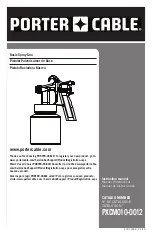
5 - ENG
IMPORTANT: Keep the spray gun clean. To avoid clogging the air and paint passages and possibly ruining
the spray gun, clean the spray gun immediately after each use.
NOTE: Paint and other material will dry quickly in
the small passages rendering the gun useless due to the difficulty of removing hardened paint from the passages
inside the gun.
If the passages become clogged and the spray gun stops working, follow the instructions in “TO
CLEAN PASSAGES” below.
After Each Use
Shut off the air supply to the tank and release the pressure in the tank before cleaning
to avoid injury.
1. Drain and clean the cup. To clean the gun passages, put a small amount of thinner or approved solvent in
the cup. Attach the cup to the gun, start the compressor, set the regulator to 25-50 PSI and spray the liquid
through the gun while shaking the gun vigorously. Periodically pull and release the trigger to help break loose
dried-on material.
2. Wipe the gun and cup exterior with a solvent soaked rag.
To avoid of the risk of fire and/or explosion, place cleaning rags and other flammable
waste materials in a secured metal container. The container should be disposed of properly in accordance
with local, state and federal regulations.
3. When cleaning out water based paints or materials with water, start the compressor, set the regulator to 25-50
PSI and spray mineral spirits through the gun afterwards to prevent corrosion.
When blowing out the hose, the open end should be aimed away from any person to
avoid blowing solvent into the eyes or skin causing possible injury.
To Clean Clogged Passages
1. Disassemble the spray gun and soak all metal parts in thinner or appropriate solvent for 15-30 minutes. A
longer soaking time may be required for severely clogged passages. Clean the parts with a soft wire brush.
NOTICE: Do not use lye or other alkalis solutions to clean the spray gun. These solutions attack
aluminum alloys and will ruin the spray gun over time.
NOTICE: Never use metal objects to clean precisely drilled passages. Damaged passages will cause
improper spraying.
2. Apply light machine oil to the leather packing. This will help prevent air leakage. If air leakage continues
after application of oil, the packing is probably worn out and should be replaced. The gun’s packing and
o-rings will be damaged by leaving the spray gun assembly immersed in solvent over extended periods.
USER-MAINTENANCE INSTRUCTION
TOOL SPECIFICATIONS
FREE WARNING LABEL REPLACEMENT:
If your warning labels become illegible or are missing, call 1-(888)-
895-4549 for a free replacement.
This spray gun is designed to operate best at pressures between 25-50 PSI. Never
attempt to operate this spray gun at pressures in excess of 50 PSI.
7. Begin spraying. Hold the gun about 6 to 9 inches from the work surface and while moving the gun from side
to side, depress the trigger to begin applying material. To avoid blobs, runs and lap marks, keep the gun in
motion at all times before, after and while the trigger is depressed (see Figure D). Practice painting on a
piece of scrap material or cardboard until the test coating results are acceptable, making adjustments as
follows:
a. Fluid control knob (see Figure B) - turn in a clockwise direction to close and
counterclockwise to open. This knob controls the amount of paint that is mixed
with the air.
NOTE: If the fluid control knob is turned in all the way, the gun
will emit only air.
b.
Spray pattern shape
(see Figure E) - loosen the air cap nut and turn the air
cap for the desired spray pattern. Hand tighten the air cap nut after adjustment.
Full fan pattern
used with the spray gun 6-9” from the work surface. To
achieve this pattern, turn the air cap either horizontally or vertically.
Do not turn the fluid control knob out past the first visible thread
while the paint gun is under pressure or it could fly out and cause serious injury.
Cup Capacity
1 Quart
Nozzle Size
1.5 mm
Air Inlet
1/4” NPS (male)
Average SCFM Requirements
2.4 SCFM @ 40 PSI
Operating Pressure
Do not exceed 50 PSI
E






































